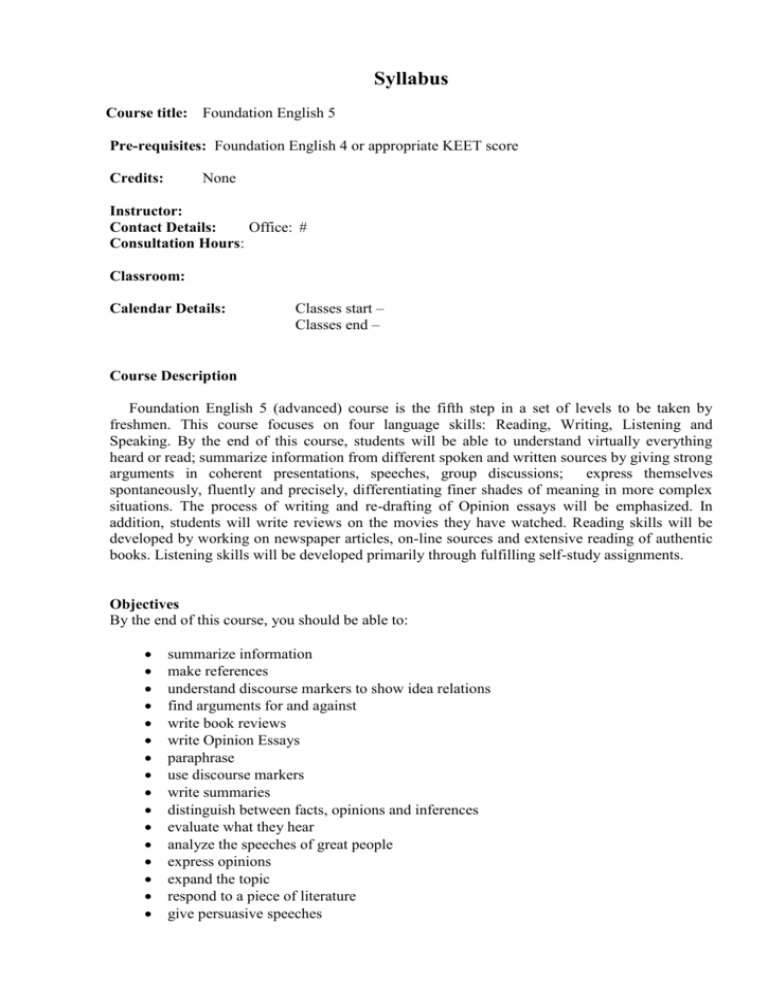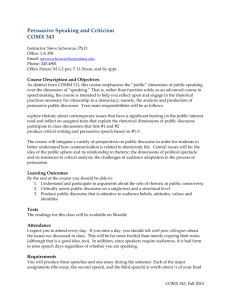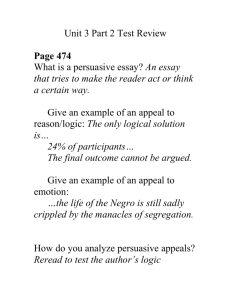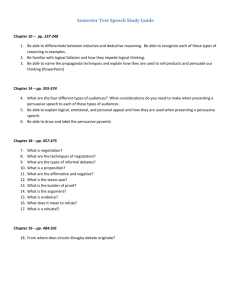Course Content and Expectations
advertisement

Syllabus Course title: Foundation English 5 Pre-requisites: Foundation English 4 or appropriate KEET score Credits: None Instructor: Contact Details: Office: # Consultation Hours: Classroom: Calendar Details: Classes start – Classes end – Course Description Foundation English 5 (advanced) course is the fifth step in a set of levels to be taken by freshmen. This course focuses on four language skills: Reading, Writing, Listening and Speaking. By the end of this course, students will be able to understand virtually everything heard or read; summarize information from different spoken and written sources by giving strong arguments in coherent presentations, speeches, group discussions; express themselves spontaneously, fluently and precisely, differentiating finer shades of meaning in more complex situations. The process of writing and re-drafting of Opinion essays will be emphasized. In addition, students will write reviews on the movies they have watched. Reading skills will be developed by working on newspaper articles, on-line sources and extensive reading of authentic books. Listening skills will be developed primarily through fulfilling self-study assignments. Objectives By the end of this course, you should be able to: summarize information make references understand discourse markers to show idea relations find arguments for and against write book reviews write Opinion Essays paraphrase use discourse markers write summaries distinguish between facts, opinions and inferences evaluate what they hear analyze the speeches of great people express opinions expand the topic respond to a piece of literature give persuasive speeches Course Content and Expectations 1. Methodology Tasks (open-ended and closed-ended) are the organizing principle in a task-based approach. In order to increase the amount of student involvement teacher –learner interaction is based on pair, group and individual work. The focus of classroom interaction is directed away from the teacher. Speaking is developed by breaking down the speaking skill into a number of discrete sub- skills, such as opening and closing conversations, turn-taking, repairing, paraphrasing, etc. Listening skills are developed through segmenting the stream of speech into recognizable units, searching for discourse markers and using them to predict changes in the direction of the talk, selecting key information relevant to the purpose of listening. Reading skills are achieved by analyzing text and text purpose, summarizing information, understanding discourse markers to see idea relations. Writing skills are developed via paraphrasing, summarizing, writing book reviews and expressing opinions. 2. Course Plan Two topics to be covered: Relationships and Career 3. Project work Component Project work will help you to develop the ability to think critically. You are expected to work with your English in an autonomous manner on a daily basis. Self-study will help to improve your level of English. It includes: working on a topic, writing summaries, reading articles from newspapers, magazines, online sources, making surveys, listening to news and speeches and making notes. Students must write 3 -4 pages on a daily basis. 4. Additional Information Assessment and Grading Students are assessed on a weekly basis regarding all the outcomes mentioned above. Attendance and participation 10 % Projects: 35 % 15 % 10 % 10 % Portfolio First opinion essay First persuasive speech (in pairs) 10 min speech 5 min discussion) Home Reading and Film Reviews 15 % Final Assessment 40 % 15 % 15 % Opinion essay Persuasive speech ( individually) 10 min speech; 5 min discussion ) Portfolio 10% Home Reading and Movie Watching Home reading includes reading (extensive) different original stories (not less than 40 pages per week) to be able to perform different kinds of tasks. Tasks on watching movies include discussions and film reviews. Final Assessment Final assessment includes Final Persuasive speech, Final Opinion Essay and Portfolio. Final Persuasive Speech Final speech is based on project work. Students start working on their Final Speech on the 4th week of studies. The process of preparation will consist of several stages: choosing the topic justification of it doing research doing survey Final Opinion Essay Final Opinion Essay is based on project work. Final Portfolio includes: articles with summaries and vocabulary assignments critical thinking questions listening materials with notes, summaries and references The passing grade is 60%. Books and Materials: Paulette Dale and James C. Wolf Longman Speech Communication Made Simple.. Patrick Sebranek, Verne Meyer and Dave Kemper Write for College http://www.esl-lab.com/ http://www.bbc.co.uk/worldservice/learningenglish/teachingenglish/plans/witn_archive.shtmlww w.bre akingnewsenglish.com http://topics.cnn.com http://www.voanews.com/english http://www.guardian.com/en/index1.html http://www.guardian.co.uk/audio http://www.timesonline.co.uk/tol/tools_and_services/podcasts/ http://www.independent.co.uk/extras/sound-and-vision/?vid=759704 http://www.bbc.co.uk/radio4/podcasts/ http://www.nytimes.com/ref/multimedia/podcasts.html http://www.openculture.com/2006/10/university_podc.html http://www.openculture.com/2007/07/freeonlinecourses.html http://www.podcastalley.com/ Attendance Policy Students are expected to attend all classes. At 15% of missed classes a student will get “Fail” for the course automatically. There is no distinction between excused and unexcused absences. Students are required to be on time for all classes. If students arrive later than 10 minutes after the start of the class, instructors have the right to refuse entry. This includes attendance at final exams. Participation Evaluation Criteria 10% 8% 6% 4% 2% 0% Student always contributes activity and positively in class and works well with classmates. Tasks and homework are always completed on time. Overall, displays an excellent attitude. Student is nearly always active and positive in class. 90% of tasks and homework are completed on time. Student shows a reasonable attitude in class, contributing well most of the time. But sometimes homework and other tasks are not completed or given on time ( 70% to 80%) Student participates passively. Generally does not cooperate in group activities. Tasks and homework are often not done on time. Student’s contribution is rarely adequate. Negative or apathetic class conduct. Tasks seldom or never done. Unable to judge properly due to total or almost total lack of participation or attendance. The instructor is responsible for informing students of the attendance and participation policy approved at the department and its effect on their grade during the first class period. The student is responsible for knowing the policy for each class. Ethics For further details refer to “Codes of Conduct” in the KIMEP Catalog. Approved by: 1. ___________________________ Zaira Utebayeva Chair: Language Center Curriculum Committee 2. ___________________________________ Kenneth J. Saycell Director: Language Center ____________________ Date _______________________________ Date





